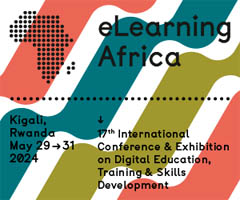"Maturity and Quality for the Chinese Market"
 Stuttgart, December 2015 - German training providers are to export their services to China on a commercial basis. Under the name DRAGON, six organizations have joined forces in a project funded by Germany's Ministry of Education and Research (BMBF) to establish a training system for production management and production technology in the world's most populous land. At LEARNTEC 2016, Jürgen Wilke, project coordinator at the Fraunhofer Institute for Industrial Engineering (IAO), which is a participant, will report on the project.
Stuttgart, December 2015 - German training providers are to export their services to China on a commercial basis. Under the name DRAGON, six organizations have joined forces in a project funded by Germany's Ministry of Education and Research (BMBF) to establish a training system for production management and production technology in the world's most populous land. At LEARNTEC 2016, Jürgen Wilke, project coordinator at the Fraunhofer Institute for Industrial Engineering (IAO), which is a participant, will report on the project.
What is the DRAGON project?
Jürgen Wilke: The DRAGON project will establish a prototype of a training system for production management and production engineering tasks that provides users with certified qualifications at various levels in different content sectors. The open training system, which will also offer a platform to other providers of educational services in this field, will seek to develop competence after a period of practical work on the job.
How did you get the project in China on track?
Jürgen Wilke: We knew that Germany can offer excellent professional training programs and asked ourselves about potential Chinese customers for our training-services products, for which we use the German initials "BDL". The question was specifically posed to companies in manufacturing, which helped us identify multiple channels and, at the same time, enabled us to come to grips with potential technical problems in advance. Today we offer our content in China via various formats.
What services are actually offered?
Jürgen Wilke: Our formats range from open online courses dealing with, for instance, pneumatic, hydraulic, and industrial robots or on-demand electric drives to virtual classrooms for virtual teams, on to free or fee-based Moodle courses. In our DRAGON Moodle learning- management system, there are courses that demonstrate production techniques and production management methods.
There are free courses for basic knowledge, as well as more complex courses that help participants acquire specific state-of-the-art competencies for modern production. The duration ranges from a few hours to much longer courses that have a final exam and offer a digital certificate. Many open courses are free of charge, but there are others for which participants have to pay a registration fee. In addition, companies and learning excursions offer onsite bricks-and-mortar-based, face-to-face programs. For our courses in a virtual team room, we use Vitero, which is oriented toward the type of work that is usually done in teams.
To what extent do the programs take the needs of your Chinese customers into consideration?
Jürgen Wilke: The courses on Production Management and Technology were developed in an application-specific context and impart hands-on skills. The programs resulting from this perspective build capacities of direct relevance to the specific needs of our Chinese customers.
Depending on their individual needs, people participating in onsite "BDL" programs can either take face-to-face courses or use an Internet platform, which is very flexible. Our DRAGON Remote Laboratories are very special: real, physical production facilities that can be operated via the Internet. Users can observe via video camera whether what they have programmed at a distance is actually done by the components. It’s not only a simulation, but the actual hardware.
And how does the future of DRAGON look?
Jürgen Wilke: Following the funded phase, the project partners plan further, profitable operation of the training system in conjunction with other organizations. The current project will generate action-guiding knowledge of how mature, high-quality education services can be systematically developed for the Chinese market.
The DRAGON project
In the project, funded by Germany’s Federal Ministry of Education and Research, a training system is being developed for production management and production technology. The system provides certification at various levels for different content areas. The certification steps start with digital badges, which can be earned and collected by completing free courses. The highest-level certificates require payment of course fees and passing exams.
The central aim of the project is building a virtual organization for the export of education services that serve the creation of work-related competences for production management and the use of production techniques. The resulting virtual company is open to other providers of educational services.
The Project Partners
Fraunhofer Institute for Industrial Engineering (IAO - Institut für Arbeitswirtschaft und Organisation)
Institute for Production Science at the Karlsruhe Institute of Technology (Institut für Produktionstechnik am KIT)
Competence Center Automation CCAD
Winkler Training Center Inc. (Winkler Bildungszentrum GmbH)
Global Advanced Manufacturing Institut GAMI´*
Vitero GmbH









